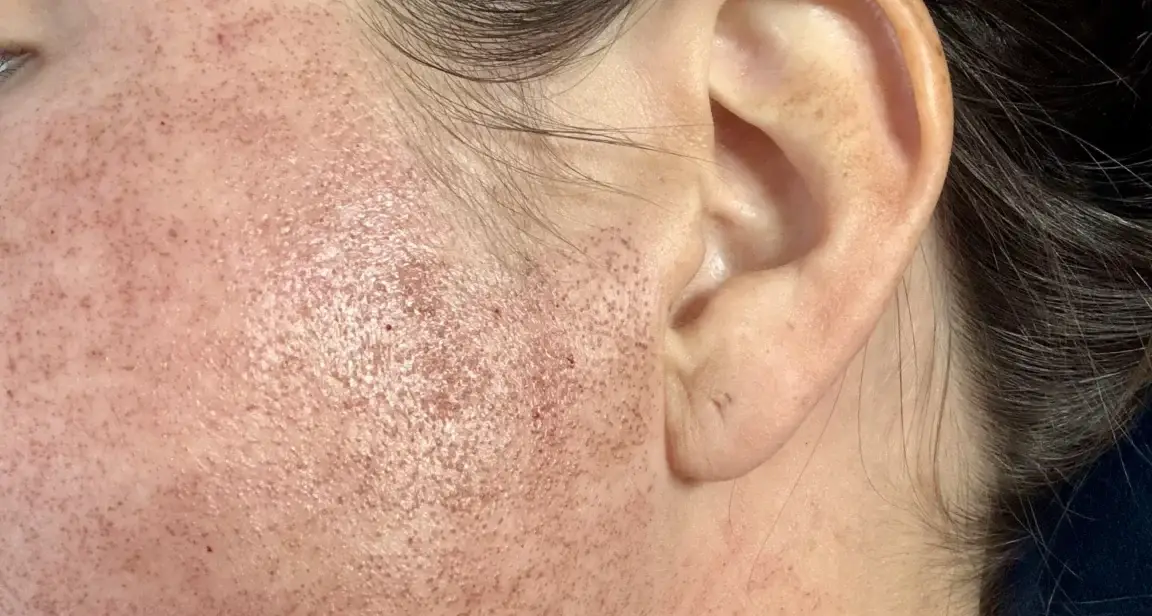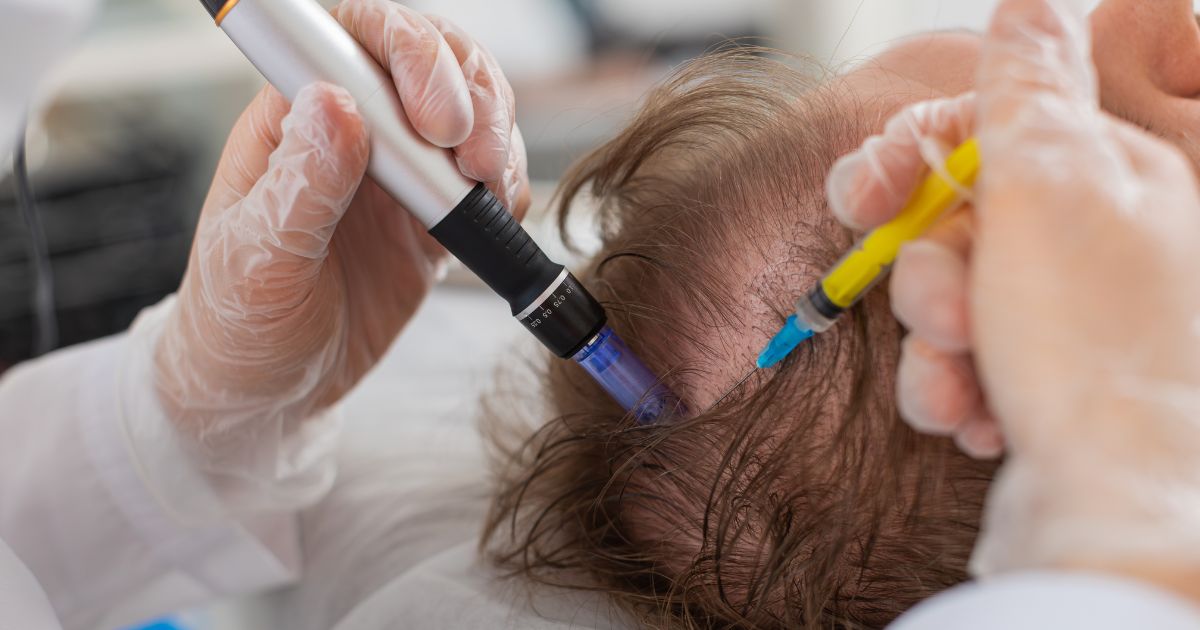Table of Contents
Introduction
Exfoliation is essential in every skincare regimen for removing dead skin cells, enhancing skin texture, and exposing a more radiant complexion. Choosing the best approach for your skin might be difficult with so many options available. Dermaplaning treatment is gaining popularity for its ability to provide smooth, radiant skin while removing peach fuzz. But how does it compare to other exfoliation techniques?
If you’re considering dermaplaning in Manchester, NH, or other facial exfoliation methods, this guide will help you understand the differences, benefits, and best choices for your skin.
What is Dermaplaning?
The top layer of dead skin cells and fine vellus hair (peach fuzz) are softly removed with dermaplaning, a non-invasive skincare procedure. A skilled practitioner uses a sterile surgical blade to exfoliate the skin, leaving it feeling incredibly smooth and renewed.
Benefits of Dermaplaning:
- Instantly smoother skin
- Enhances product absorption
- Removes peach fuzz for a flawless makeup application
- No downtime required
- Safe for most skin types
- It helps minimize the appearance of fine lines and wrinkles
- Encourages cell renewal for a fresher complexion
For a more even and radiant complexion without harsh chemicals or recovery time, dermaplaning in Manchester, New Hampshire, is a popular choice.
Comparing Dermaplaning to Other Exfoliation Methods
While dermaplaning offers impressive results, other exfoliation techniques can also improve skin texture. Here’s how it compares to other popular methods.
1. Dermaplaning vs. Chemical Peels
Glycolic, lactic, or salicylic acid acids are used in chemical peels to break down dead skin cells and promote the growth of new ones. Unlike dermaplaning, which provides immediate smoothness and removes peach fuzz, chemical peels take a few days to show results and do not remove facial hair. Chemical peels can be more effective in reducing hyperpigmentation and treating acne-prone skin, but they may cause sensitivity or peeling, which requires some downtime. In contrast, dermaplaning is a gentler alternative with no recovery period, making it ideal for those with sensitive skin or those looking for an immediate glow.
2. Dermaplaning vs. Microdermabrasion
Microdermabrasion is another physical exfoliation method, but it uses a machine with a diamond-tip or crystal-based system to buff away dead skin cells. While both procedures offer deep exfoliation, microdermabrasion does not remove peach fuzz, making dermaplaning the preferred option for smoother makeup application. Microdermabrasion can sometimes be too abrasive for sensitive skin, leading to temporary redness or irritation. Dermaplaning, on the other hand, provides a gentler exfoliation experience while still delivering brightening effects and improved skin texture.
3. Dermaplaning vs. Enzyme Exfoliation
Enzyme exfoliation relies on natural fruit enzymes to break down dead skin cells without using physical or chemical abrasion. This method is particularly suitable for individuals with highly sensitive skin or those prone to irritation. While enzyme exfoliation can provide hydration and gradual skin renewal, it does not deliver the instant smoothness of dermaplaning. Furthermore, enzyme exfoliation does not remove peach fuzz, making dermaplaning the superior choice for those looking to achieve a completely smooth and hair-free complexion.
4. Dermaplaning vs. At-Home Scrubs
At-home scrubs are a popular DIY exfoliation method that uses small exfoliating particles to remove dead skin cells manually. However, many scrubs can be too harsh, leading to micro-tears in the skin and causing irritation. Unlike dermaplaning, which professionals perform to ensure safety and precision, at-home scrubs can sometimes lead to over-exfoliation, resulting in redness and sensitivity. Additionally, scrubs do not remove peach fuzz and may not offer long-term skin benefits. For those seeking a safe and effective exfoliation method with noticeable results, dermaplaning in Manchester, NH, remains a superior choice.
Who Should Consider Dermaplaning?
Dermaplaning is suitable for a wide range of skin types and concerns. This treatment may be perfect if you’re looking for peach fuzz removal in NH or a gentle way to improve skin texture.
Ideal Candidates:
- Those looking for instant skin rejuvenation in Manchester
- People with dry or rough skin
- Individuals wanting a non-invasive skincare solution
- Anyone who struggles with dullness and uneven skin texture
- Those who wear makeup regularly and want a smoother base
Who Should Avoid It?
- Those with active acne or severe breakouts
- Individuals with open wounds or skin infections
- People with extremely sensitive skin are prone to irritation
- Those with a history of keloid scarring
Post-Treatment Care and Tips
To maximize the benefits of dermaplaning treatment, follow these aftercare guidelines:
- Use a gentle cleanser to keep skin clean without irritation.
- Apply sunscreen daily to protect your fresh skin from UV damage.
- Avoid harsh skincare products (such as retinol or strong acids) for a few days.
- Stay hydrated to maintain a plump and glowing complexion.
- Schedule regular treatments for ongoing skin improvement.
How Often Should You Get Dermaplaning?
The frequency of dermaplaning treatments depends on individual skin needs and goals. For most people, dermaplaning is safe every 3 to 4 weeks. This timeframe allows your skin to complete its natural renewal cycle and prevents over-exfoliation. If you have sensitive skin, your aesthetician may recommend longer intervals between treatments to ensure optimal results without irritation.
Regular dermaplaning sessions can help maintain a consistently smooth and refreshed appearance for those looking for long-term skin rejuvenation in Manchester.
Is Dermaplaning Safe for All Skin Types?
Standard, dry, combination and sensitive skin types can all safely undergo dermaplaning; however, those with severe rosacea or active acne may need to see a skincare specialist before beginning therapy. If your skin is prone to breakouts, other exfoliation methods like enzyme treatments or mild chemical peels may better suit your needs.
Can Dermaplaning Be Combined with Other Treatments?
Yes! Dermaplaning pairs well with many other skin treatments to enhance overall results. It is often performed before:
- Hydrating facials allow serums to penetrate more deeply
- Chemical peels for more effective exfoliation
- LED light therapy to improve skin healing and glow
- Microneedling to enhance collagen stimulation
If you’re considering combining facial exfoliation in Manchester with other skincare treatments, consult a licensed professional at The Alchemy Clinic to create a personalized skincare plan.
Conclusion: Which Exfoliation Method is Right for You?
Choosing the proper exfoliation technique depends on your skin type, goals, and sensitivity level. While chemical peels and microdermabrasion offer deep resurfacing, dermaplaning treatment combines exfoliation and peach fuzz removal for a smoother, brighter complexion. Ready to reveal softer, brighter skin? Book your Dermaplaning appointment today and experience the benefits firsthand.
For more personalized skincare advice, contact The Alchemy Clinic. Our team is here to help you achieve glowing, healthy skin with the best treatments available!










